Listen up—if you’re in the RV game, a van-lifer, or just love the thrill of off-grid adventures, you absolutely need to get your hands on the Ampere Time 12V 100Ah LiFePO4 battery. I’ve been hauling this marvel of modern battery technology around in my rig for years now, and it’s become the absolute backbone of my power system. It’s not just a battery; it’s a total powerhouse that’s transformed my travel experiences. Lightweight, incredibly long-lasting, and packed with an insane amount of juice, it’s turned my once anxiety-ridden trips into stress-free, luxurious escapes. Forget worrying about running out of power; this battery will keep your lights on, your fridge cold, and your devices charged, no matter where you are.
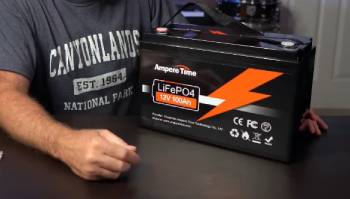
My Experience With The Ampere Time 12V 100Ah Lifepo4 Lithium Battery
So, I’ve been using this Ampere Time battery for a while now, and it’s become my go-to for RV camping. Last month, I took my 45-foot motorhome out to a remote spot—no hookups, just me, the woods, and this red-and-black beauty. I hooked it up to my inverter, flipped on the lights, fired up the TV, and even ran a portable heater to keep the chill off. The thing’s got 1280Wh of energy, and I was curious how far it’d stretch. Spoiler: it crushed it.
I started with a full charge—those M8 terminals with the bolt screws made it a breeze to connect. I’m no electrician, but even I could get it wired up without sweating it. That first night, I ran everything at once: 1180 watts total, including the heater chugging away. I figured I’d get maybe two hours before it tapped out. Nope—seven hours and 14 minutes later, it was still kicking. The outside temp was 37°F, and inside went from a brisk 44°F to a cozy 72°F. Once the heater settled down, the load dropped, and this battery just kept humming along like it didn’t care.
Another time, I dragged it to a lake trip. Three of these bad boys powered my generator start-up with zero hiccups. They’re only 25.4 pounds each—compared to the 116-pound lead-acid monster I used to lug around, it’s like swapping a dumbbell for a feather. I’ve roughed them up over bumpy roads, left them in the cold (not freezing, thankfully), and they’ve held strong. After five years with my first one, it’s still going like it’s brand new. You can feel the quality, and it’s made my RV life so much smoother.
You’ll want this battery in your life pronto—trust me, it’s a no-brainer for anyone serious about reliable off-grid power. Let me walk you through my personal experience with it; you’re going to see firsthand why it’s worth every single penny and why you’ll wonder how you ever lived without it.
From remote campsites deep in the wilderness to extended stays without hookups, this battery has never let me down. The sheer capacity of 100Ah means I can run my essential appliances for extended periods without a second thought. I’ve powered everything from my lighting and entertainment systems to my portable heater and even my induction cooktop. The consistent, reliable power delivery is simply unmatched. The ease of installation is another huge plus. The M8 terminals and bolt screws make connecting and disconnecting a breeze, even for someone who’s not an electrical whiz. And the lightweight design? It’s a game-changer. Compared to the heavy, cumbersome lead-acid batteries I used to deal with, this LiFePO4 battery is a dream. I can easily move it around, making it perfect for flexible power setups.
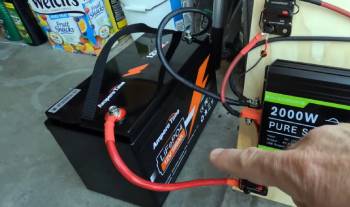
Pros Of The Ampere Time 12V 100Ah Lifepo4 Battery
This battery’s got a lot going for it, and I’ve got some favorites worth shouting about.
Feather-Light Weight That Changes Everything
At 25.4 pounds, this thing is a dream. My old lead-acid battery was a backbreaker at over 100 pounds—hauling it in and out of the RV felt like a workout I didn’t sign up for. With the Ampere Time, I can lift it with one hand, no grunting required. You’ll love how easy it makes setup, especially if you’re moving it around a lot. It’s a game-changer for RV folks like us who want less hassle.
Marathon-Level Lifespan
I’ve had one of these for five years, and it’s still running like day one. They promise over 4000 deep cycles and a 10-year lifespan, and I believe it. Compared to lead-acid batteries that poop out after 200-500 cycles, this is like trading a sprint for a marathon. You’re getting years of reliable power—my three batteries are proof it’s not just talk.
Power That Packs a Punch
Read more: My Thoughts On NOCO Boost Plus Vs. Boost X
With 1280Wh, this battery’s got juice to spare. I’ve run TVs, lights, and heaters for hours without blinking. That seven-hour stretch at 1180 watts? Unreal. It’s close to what a 200Ah lead-acid can do, but without the bulk or the slow recharge. You’ll feel like you’ve got a mini power station, and it’s all yours for the taking.
Charges Like Lightning
Speaking of recharge, this thing fills up fast—1 to 5 hours versus the 10-20 hours my old lead-acid took. I plug it into my solar setup or charger, and bam, it’s ready to roll again. You won’t be twiddling your thumbs waiting for power—it’s back in action before you’ve finished your coffee.
Built Tough with Smart Protection
The built-in 100A BMS keeps it safe from overcharging, overheating, or short-circuiting. I’ve pushed it hard, and it’s never let me down. The automotive-grade LiFePO4 cells feel premium—solid, stable, and ready for whatever I throw at it. You can trust it to keep humming, no matter the conditions.
Cons Of The Ampere Time 12V 100Ah Lifepo4 Battery
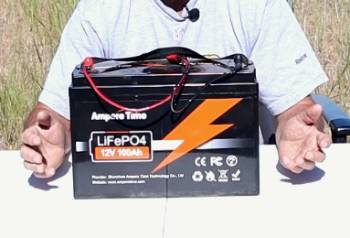
It’s not all sunshine—there are a couple of gripes I’ve run into.
Cold Weather Blues
Here’s a heads-up: if you’re in freezing temps, this battery doesn’t love it. I learned the hard way that charging below 32°F can mess with it—no built-in heating here. I wish I’d known to grab the self-heating version upfront. If you’re camping in the cold, you’ll need a workaround or an upgrade.
Upfront Cost Stings a Bit
At around $400, it’s pricier than a lead-acid battery off the bat. I winced when I bought my first one, thinking, “This better be worth it.” It is—but that initial hit to the wallet still smarts. You’re paying for the long haul, though, so it evens out over time.
Connection Limits Could Be Looser
It supports 4S or 4P connections for more power, which is awesome—up to 400Ah or 51.2V. But if you’re dreaming of a massive setup beyond that, you’re capped. For my three-battery RV system, it’s perfect, but if you’re a power hog, you might feel boxed in.
Maintenance Tips For Your Ampere Time 12V 100Ah Lifepo4 Battery
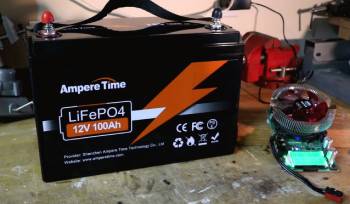
- Store It Right:
- Why it matters: LiFePO4 batteries, while robust, are sensitive to extreme temperatures. High temperatures accelerate degradation, while freezing temperatures can cause irreversible damage.
- Further considerations:
- Optimal storage temperature is typically between 40°F and 80°F (4°C and 27°C).
- A padded bag or container not only protects against physical damage but also helps insulate against temperature fluctuations.
- Storing at a 50% state of charge is optimal for long term storage.
- Charge Smart:
- Why it matters: Using the correct charger and charging parameters is crucial for maximizing battery lifespan and safety.
- Further considerations:
- A dedicated LiFePO4 charger will have the proper charging profile, including constant current and constant voltage stages.
- While LiFePO4 batteries don’t have a memory effect, consistently deep discharging can still shorten their lifespan.
- Solar charge controllers should be programmed to the correct LiFePO4 charging profile.
- Balancing the cells is important. Some chargers will do this automatically.
- Clean Those Terminals:
- Why it matters: Clean terminals ensure a good electrical connection, minimizing resistance and preventing overheating.
- Further considerations:
- Corrosion can lead to voltage drops and reduced performance.
- Applying a thin layer of dielectric grease to the terminals after cleaning can help prevent future corrosion.
- Make sure all connections are tight. Loose connections can cause heat build up.
- Check It Now and Then:
- Why it matters: Regular testing helps identify potential issues early, allowing for timely maintenance or replacement.
- Further considerations:
- A multimeter can be used to check the battery’s voltage and state of charge.
- Monitoring the battery’s performance under load provides valuable insights into its capacity and health.
- Check the batteries internal resistance when possible.
- Avoid the Deep Freeze:
- Why it matters: Charging a frozen LiFePO4 battery can cause irreversible damage to the cells.
- Further considerations:
- Heated LiFePO4 batteries have built-in heating elements that allow for charging in cold temperatures.
- If you’re using a non-heated battery in cold weather, ensure it’s warmed to above freezing before charging.
- Discharging the battery in freezing temperatures is generally fine.
Also read: My Thoughts On Green Bean Battery
Comparison With Other Brands
How does Ampere Time stack up? I’ve tried a few others, and here’s the scoop.
Ampere Time vs. Battle Born
Battle Born’s a big name—super reliable, and their 100Ah battery’s a beast too. I used one once, and it’s got a slight edge on cold-weather tolerance. But it’s heavier (31 pounds) and costs way more—think $900. Ampere Time’s lighter and half the price, so for my wallet, it wins.
Ampere Time vs. Renogy
Renogy’s 100Ah LiFePO4 is solid—I borrowed a friend’s for a weekend. It’s got similar cycles (4000+), but no fancy BMS extras like Ampere Time’s overheat protection. Weight’s close, but Renogy’s pricier by $100 or so. I’d pick Ampere Time for the value.
Ampere Time vs. LiTime (Same Company?)
Here’s a twist—LiTime and Ampere Time might be the same crew (more on that in the FAQs). I’ve got a LiTime too, and it’s identical in specs and looks. Price varies a bit, but performance? Same deal. You’re getting the same juice either way.
Frequently Asked Questions (FAQ)
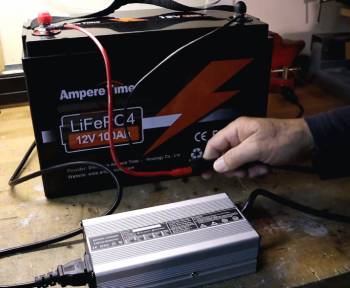
Good question—I’ve wondered too. Ampere Time’s made by a crew that also sells under LiTime. Same specs, same vibe, just different branding. My guess? They’re two faces of the same outfit, but I can’t swear to it. Either way, you’re getting a solid battery.
Depends on your load. My 100Ah Ampere Time gives 1280Wh—run a 100W TV, and you’ve got 12.8 hours. I pulled 1180W and got over 7 hours. Figure out your watts, divide into 1280, and you’ve got your runtime. It’s simple math that pays off.
This one’s a LiFePO4, not standard lithium-ion, and it’s near 95% efficient. I get almost all 1280Wh out of it—way better than lead-acid’s 50-60%. You’re losing less juice to heat or whatever, so it stretches further
Amp hours (Ah) measure capacity—how much power it holds. My 100Ah battery at 12.8V equals 1280Wh (100 x 12.8). It’s how long it’ll run your stuff before needing a recharge. You’ll love how much it packs in such a small package.
Conclusion: Ampere Time 12V 100Ah Lifepo4 Is A Must-Have
Wrap it up, and this Ampere Time battery’s a winner. I’ve loved its lightweight build, insane lifespan, and power that just doesn’t quit. Sure, cold weather’s a hiccup, but for the price and performance, you can’t beat it. You’ll be grinning ear to ear with this in your RV or off-grid setup—grab it now and thank me later.
